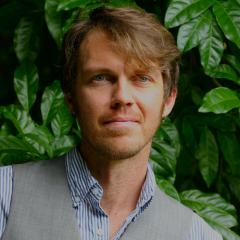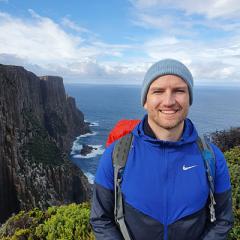New research led by CBCS PhD candidate Scott Spillias reveals the global potential for seaweed farming in the world’s oceans and investigates the local and global implications of developing this watery form of farming.
Scaling seaweed
Scott and fellow CBCSers Dr Rich Cottrell and Professor Eve McDonald-Madden have led two successful international collaborations to both estimate how farming seaweeds globally might reshape the impacts of land use and catalogue the social and ecological impacts of farming seaweeds at a local scale.
In the first study, undertaken as part of the Young Scientists Summer Program at the International Institute for Applied Systems Analysis in Vienna, the team estimate that roughly 650 million hectares of global ocean could support seaweed farms. While this is a huge amount of space, that figure represents just under 2% of the global ocean. The team go on to show that only a fraction of this space would be needed to have considerable impacts on terrestrial agriculture: using the Global Biosphere Management Model (GLOBIOM), Scott and his colleagues estimate that roughly 50 million hectares of ocean could supply 10% of future expected human food demand while saving over 100 million hectares of terrestrial land and avoiding ~1 Gt of CO2 equivalent per year in emissions from agriculture. Perhaps even more impressive is the ~2.6 Gt CO2e per year that could be avoided by incorporating Asparagopsis supplements into the diets of the world’s ruminants.
Of course, these scenarios represent lofty ambitions that sit at the extreme edge of what is possible or likely. And indeed, many economic, logistical and cultural barriers still stand in the way of scaling seaweed production and demand. So in their second study, Scott and his CBCS colleagues engaged with another international team of researchers to explore the evidence for the social and ecological impacts of seaweed farming on a local scale. Together with colleagues from three east Asian countries whose seaweed industries are already well established, China, Japan and South Korea, they systematically reviewed the scientific literature on seaweed farming to identify the range of documented impacts on people and nature.
Biodiversity impacts – and the future for Scott
Encouragingly, they found that across many social and environmental dimensions seaweed farms have generated benefits, including by providing livelihoods, lifting living standards, remediating eutrophic coastal waters and regulating carbon. Nevertheless, of the 20 possible impacts that have been observed, the majority of evidence is either too variable to conclude that seaweed farming has been wholly positive, or there is not enough evidence to draw conclusions. Notably, when it comes to impacts on biodiversity, which have been well studied, an almost even split is seen between demonstrated positive and negative impacts on a range of flora and fauna.
Taken together, this new research shows that while the global potential for reducing land-use pressure with seaweed farms may be considerable, there may be local consequences that will need to be avoided or mitigated. And while much of the popular discourse around seaweed farming has focused mainly on the positives, researchers, policy-makers and the farmers themselves will need to carefully plan and prepare for ensuring that seaweed farms fulfil their potential across a range of sustainable development objectives.
Now that his PhD is wrapped up, Scott has headed south to Tasmania to take up a postdoctoral fellowship with CSIRO. There he will be shifting his attention away from (sea) weeds and over to the role that artificial intelligence might play in helping us to model and understand marine ecosystems.
Spillias, S., Valin, H., Batka, M., Sperling, F., Havlík, P., Leclère, D., Cottrell, R.S., O’Brien, K.R. and McDonald-Madden, E. (2023). Reducing global land-use pressures with seaweed farming. Nature Sustainability, pp.1–11.
Spillias, S., Cottrell, R.S., Kelly, R., O’Brien, K. R., Adams, J., Bellgrove, A., ... & McDonald-Madden, E. (2022). Expert perceptions of seaweed farming for sustainable development. Journal of Cleaner Production, 368, p.133052.
Teaser image: Seaweed lover Scott tucks in. Photo: Olivier Page
Image above: Macrocystis pyrifera is a fast-growing species of kelp that is being targeted for cold-water farms from Australia to the United States. Photo: Oleksandr Sushiko/Unsplash


